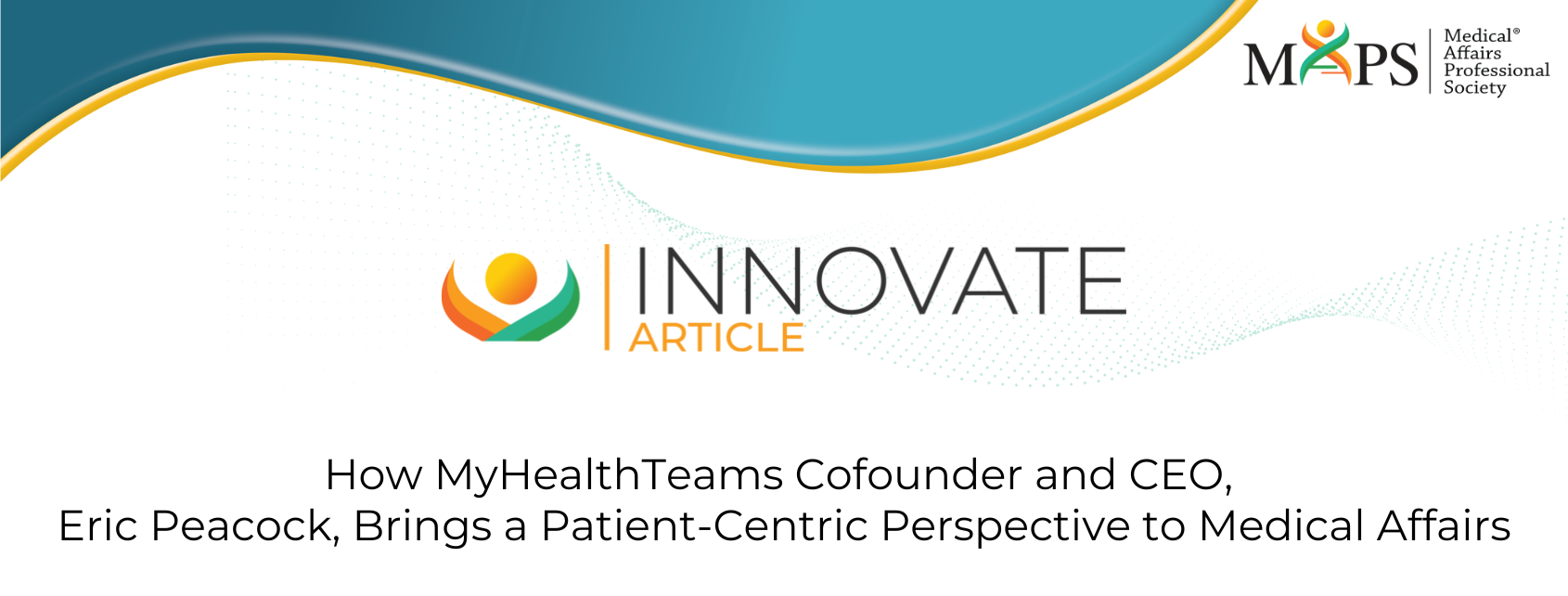“If you don’t understand the patient perspective, you’re missing opportunities to serve them,” says Eric Peacock, cofounder and CEO of patient social networks company MyHealthTeams. Here MAPS speaks with Eric about how the health communities he’s built can help the biopharmaceutical and MedTech industries develop new products that truly make a difference in patients’ lives.

Eric Peacock
MAPS: Why did you start MyHealthTeams?
Eric: When you’re diagnosed with a chronic condition, it should be easy to find the right support and information you need to manage your condition. But 10 years ago when we started, so many people said they couldn’t find anything about their condition – no information and no support – they said it felt like they were reinventing the wheel. They had to do it all alone. What should I ask my doctor? How can I make my meds tolerable? Is this new symptom I’m experiencing normal? That was the impetus behind MyHealthTeams: We should make it easy to find the people, support and information you need.
MAPS: MyHealthTeams has launched patient social networks in 41 different chronic conditions covering 15 different therapeutic areas. How can Medical Affairs contribute to knowledge in these spaces?
Eric: Let’s take dermatology where we have social networks in psoriasis, eczema, hidradenitis suppurativa, hyperhidrosis and vitiligo. I have vitiligo so I go to MyVitiligoTeam to read medically-approved content and connect with other patients about some of the questions on our minds. Like, what’s happening with these new JAK inhibitors I’ve been hearing about? What about clinical trials? What is promising or proving to be useful? That’s all information I could get from Medical Affairs. As healthcare consumers, many of us don’t know as much as we’d like to about our condition and we are not all treated at centers of excellence in our condition. Understanding the unmet needs creates a ton of opportunities for Medical Affairs teams to put patients in the center and fill these gaps in knowledge.
MAPS: So your communities are a way for Medical Affairs teams to understand the patient perspective?
Eric: Yes – our research team collaborates with our Medical Affairs partners to understand the patient perspective and address real-world patient priorities through education. Often what healthcare providers say are patient priorities and what patients say are their own priorities are not a perfect match. For example, very few people with MS talk to their neurologist about sexual dysfunction or bladder issues or memory issues, but over 50 percent struggle with these things. They feel like, “My doctor is too important to hear this stuff” or they’re just uncomfortable bringing it up. So doctors might not always be hearing what matters to these folks. But they do talk about these things in patient communities. In our social networks, people share their unfiltered truth – the firsthand experiences that only someone who’s faced similar challenges really gets. And when we partner with Medical Affairs teams to educate patients about these symptoms they are much more likely to talk to their physician about them. Maybe an organization has a drug that directly addresses these issues or can help the outcomes of those patients. There are just so many education gaps: for example, about half of the people with cognitive issues and MS didn’t know the two were related. That’s a huge patient education opportunity. Identify the gap through social listening and quantitative research. Create patient education content that provides trusted information. Meet patients when and where they’re talking about and seeking information about their health. And oh by the way – you can usually publish the results.
MAPS: What are the goals of this kind of patient education?
Eric: First, we want to help people get diagnosed sooner. For example, we worked with a Medical Affairs team at UCB that had a terrific therapy for spondyloarthritis, but many young people don’t know the back pain they’re having is inflammatory – in that case, a simple quiz helped identify those patients and the call to action was for people with this kind of back pain to go see a rheumatologist. Our second goal is once you’re diagnosed, helping you identify when you’re experiencing breakout symptoms that suggest you should be going to a more advanced therapy. Far too often, patients have had a chronic disease for 5 years but just got diagnosed last week, and formulary assumes you just got the disease and puts you on the entry-level drug when really you’ve progressed beyond that. Third, is we try to help patients find the support they need to stay on therapies that are working. One client wanted to know why people were dropping off an MS drug. Social listening in MyMSTeam, our patient community for MS, showed it was GI side effects of the drug that were making patients quit in the first 8 weeks. And we also saw people talking about a ritual they were following to mitigate this GI side effects of the drug. So in that case, we helped provide the information and support patients needed to stay on a treatment that was really helping them.
MAPS: Once you have these discoveries – say, a way to mitigate the side effects of a treatment or the insight that people with back pain don’t know it could be inflammatory – how do you communicate that back to patients?
Eric: When we do research, we empower members by sharing our findings back to our communities – through an article or resource center that puts the findings in context and provides actionable insights. Also, in the last 2 years, we’ve been working with partners in Medical Affairs to help patients hear directly from experts through live Q&As. These are video-based events in which a specialist in a given condition – like RA or Alzheimer’s or Crohn’s – addresses hot topics, ranging from whether the Covid vaccine is safe for someone with that specific disease, to what new therapies are on the horizon, to what diet may be best-suited to helping avoid flares. Across our communities, we’re seeing thousands of patients watch and engage with this content. The doctor spends one hour and makes a huge positive impact. And we then provide on-demand playback so the impact is amplified.
We also have a really good track record of our research collaborations in Medical Affairs getting published and winning talks at conferences.
MAPS: Medical Affairs has traditionally created relationships with healthcare providers and other thought leaders, with the thought being that Med Affairs could help doctors optimize the use of emerging treatments. But do you see the role of Medical Affairs changing in the direction of providing education directly to patients?
Eric: I’ve got a lot of close friends in Med Affairs, and I’m proud of their participation in directly empowering patients. Especially during the pandemic when access to HCPs was difficult. To stay relevant Med Affairs has had to do everything they can to be where the patients are. We all know now that just giving somebody a prescription is not enough for good outcomes. And Med Affairs more than anyone else are taking action on that now. What’s really cool is when our MA partners go educate physicians on what patients care about. They say, ‘We funded this research, check it out.” They’re not just trying to sell more product, but are saying, ‘Here’s what matters to these patients and here’s what we can do about it.’ That kind of patient-centric thinking goes a long way to building credibility and improving outcomes for people facing chronic conditions.
The Innovate article series highlights the ideas of Medical Affairs thought leaders from across the biopharmaceutical and MedTech industries. To submit your article for consideration, please contact MAPS Communications Director, Garth Sundem.



